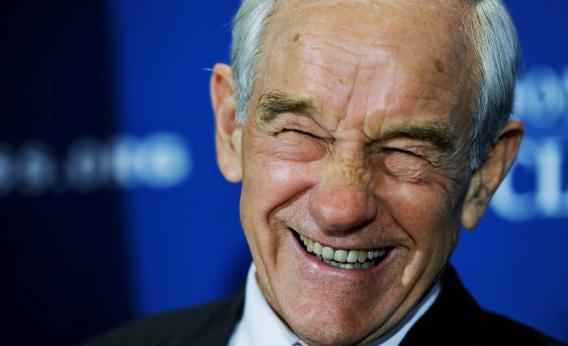WASHINGTON – Ron Paul won the presidential straw poll at the 2011 Values Voter Summit, a comeback of sorts, and return to the usual pattern of highly-organized convention takeovers by the libertarian candidate. He beat out seven other candidates and “undecided.” The full results, with 1,983 ballots cast:
Ron Paul - 36.9% (732)
Herman Cain - 22.5% (447)
Rick Santorum - 16.3% (323)
Rick Perry - 8.4% (167)
Michele Bachmann - 7.9% (157)
Mitt Romney - 4.4% (88)
Newt Gingrich - 2.7% (54)
Undecided - 0.7% (13)
Jon Huntsman - 0.1% (2)
In a post-vote press conference, FRC President Tony Perkins made sure to note that 600 people had bought tickets for Saturday only – a none-too-subtle hint that Paul’s supporters had over-represented themselves.
“Do the math,” said Perkins. “Ron Paul and his campaign are very well organized.”
The rule about straw polls: They only matter if someone’s trying to win. In 2010, Rep. Mike Pence made an effort to take the straw poll, and he won it. And then he decided not to run for president. In 2011, the only campaigns with real victory strategys were Ron Paul’s and Rick Santorum’s. This was limited – Paul’s spin-off Campaign for Liberty organization bought tickets, but the presidential campaign didn’t do anything. According to CFL’s John Tate, between their efforts and the indepenent efforts of Paul fans – “some guys rented buses and came down from New York!” – there were 700 summit passes bought by and for the man from Lake Jackson, Texas.
There was no real effort on behalf of Perry, who might as well have been grown in a lab to appeal to an audience like this. The big reasons: Herman Cain and “heartless.” Just as in Florida, Cain’s likeability and Perry’s stance on immigration choked off his possible supporters’ enthusiasm. Not even a well-received, stumble-free speech could bail him out.
“How can you change ‘heartless’?” said Karen Winterling, a happy Cain organizer from Maryland. “He can’t take that back.”
Perry didn’t work the event too hard. He arrived on Friday, spoke, did an interview with CBN News, then hot-footed it to Iowa, leaving reporters to fight over the story of his anti-Mormon endorser/introducer like starving dogs over a ham hock. Inside the Omni Shoreham, only Santorum and Paul had visible support. Their blue and white campaign signs positioned (or left behind) around the conference area. Both candidates hung around for hours after their speeches, whipping up support. But there were plenty of attendees sporting Herman Cain buttons, and many who had attended a Cain rally in Virginia on Friday. And on Friday, he delivered a speech that trebled the standing ovations of his nearest competitor. Meanwhile, Bachmann was continuing her fade with a speech not even her supporters loved.
“I was very impressed that she shared her testimony, telling us about how she found Christ,” said Lynae Flamengo, a teacher from Ohio who voted for Bachmann in the poll. The speech was good. It was a little unfocused.” She voted for Santorum in the second piece of the poll, asking who attendees liked for vice president.
What do the numbers mean for Santorum, who’s running the self-described “little campaign that could,” or Romney, who’s still the national frontrunner? This has never been a Romney-friendly event; in 2010, he only won 13 percent of the vote. His path to the nomination does not need a massive embrace from religious conservatives; it needs the candidates beloved by those voters to keep mud wrestling. This is an ideal setting for someone like Santorum, who did rise from his 5 percent showing in 2010. (The departure of fantasy candidates, like Mike Huckabee and Sarah Palin, helped him out.) But just as in Florida, he can’t escape the shadow of Herman Cain. There are reasons.
“My problem with Santorum is that he’s a little vanilla,” said Greg Rohrbough, an activist from Virginia. “When he was in the Senate, he was not a fiscal conservative.”
Rohrbough’s “heart was with Herman,” he said. Could he endure a Romney win? He sighed. “If Romney wins, I’m planting a farm and getting ready for the end of the world. My problem with him is not Mormonism. It’s the other M-word: Massachussetts. I think if he gets in there, he validates Obamacare, just as President Eisenhower validated the New Deal.”
Social conservatives expecting their leaders to stop a Romney win didn’t get much help from Perkins. I mentioned that in 2009, the late Paul Weyrich had regretted that social conservatives didn’t get behind their own candidate – Huckabee, he’d said – earlier. And in 2007, the Summit was the backdrop to some unsuccessful backroom negotiating among conservative leaders about who they should back.
I asked if the poll had hinted at one candidate for the movement to get behind, noting that Cain and Santorum had done well.
“There are several candidates I like in this race, several candidates who are friends,” said Perkins. “For me, as long as there are two or more conservative candidates in the race, there is no need for me to express a preference.”
